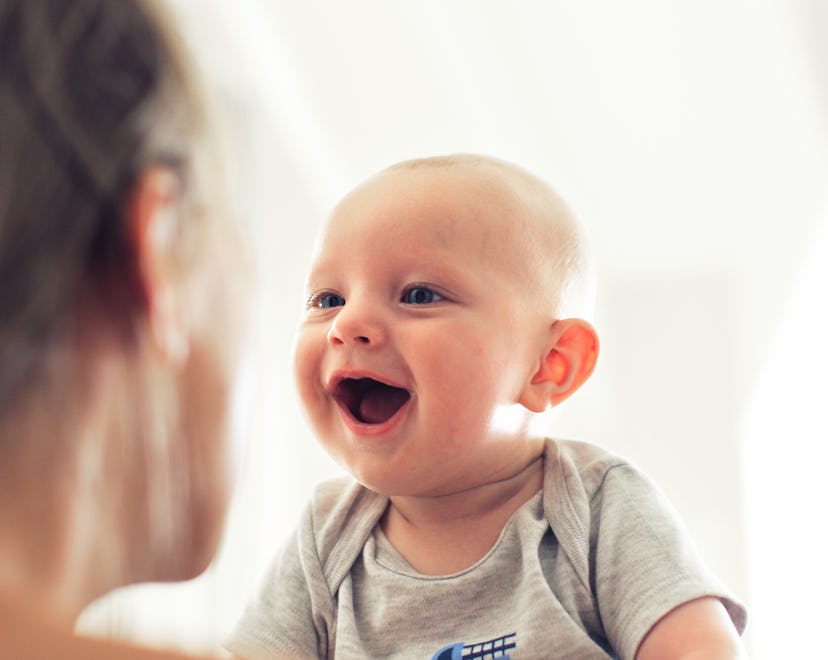Milestones

Here’s When Your Baby Will Actually Start Laughing On Purpose
Gear up for giggles.
Hearing your baby laugh for the first time is one of the most magical moments a parent can have. But you might be asking yourself, when will my baby laugh? If you’re beginning to see big smiles, your baby is on the right track. The highly anticipated baby laugh, however, requires some mega developmental work on the part of your tiny infant. So don’t assume you’ll hear giggles a month after birth.
When will my baby laugh?
It’s going to take a bit longer than you might expect, Dr. Tiffany Kimbrough, MD, pediatrician and medical director of the Mother/Infant Unit at Children's Hospital of Richmond at VCU, tells Romper. “As a pediatrician, laughing is one of my favorite milestones! We typically see laughing emerge by 4 months of age in healthy full-term babies,” says Kimbrough. Even more exciting? “Two months later children can clearly extract humor from their environment,” according to a 2017 study published in Scientific American Mind.
“Laughing is an important part of social development and there are other ways that we can see social interactions emerge,” Kimbrough adds. In addition to laughing, she says a 4-month-old will engage in other behaviors as well such as fixing on parents' faces and producing a social smile or participating in reciprocal cooing. “It is important to see progress in social interactions across these different behaviors,” she says.
Should parents be worried if babies don’t laugh?
So your child isn’t laughing at 4 months, is it time freak out? Good news, Kimbrough says you can calm down.
“It's less important to worry about delay in a single milestone than to consider the development of the whole child,” she says. “How are the other features of social development progressing? What about fine motor, gross motor, and language milestones? If social development in general is impacted, or if we are seeing delays in other areas of development, this could be an indicator that there is something else going on and your child's pediatrician or family medicine doctor will develop a plan based on their assessment for what your baby needs.”
Can lack of laughter indicate something else?
“Lack of laughter and other social development can be an early sign of autism spectrum disorder,” says Kimbrough. “But 4 months of age is very early in development to start pursuing this diagnosis.”
She adds that a major reason that pediatricians will wait (with close monitoring) is that a cardinal feature of autism is speech delay which is difficult to assess at this early infant age.
“However, if no progress in social development is made and there is speech delay that evolves over time, this will be more concerning for a potential autism diagnosis. If your pediatrician is concerned, they may refer your family to a developmental pediatrician for more in-depth assessment and ensure that there is no deficit to hearing abilities for your child,” Kimbrough says.
Like any developmental milestone, it’s important to keep an eye on your baby and note their progress, but at the same time don’t fixate on a timeline. As any pediatrician will tell you, babies grow, learn, and develop at their own pace. And in all likelihood those coveted giggles are on their way. Just be patient.
Expert:
Study referenced:
Mireault G. C. (2017). Laughing MATTERS. Scientific American mind, 28(3), 33–37. https://www.ncbi.nlm.nih.gov/pmc/articles/PMC6201262/
Dr. Tiffany Kimbrough, MD, pediatrician and medical director of the Mother/Infant Unit at Children's Hospital of Richmond at VCU
This article was originally published on